Woody Allen In Exile
A look at the once-revered director's last four films and the breaking of a decades-long moviegoing habit.
Untitled Woody Allen Project was, for decades, part of a moviegoing routine. Woody Allen would write and direct a movie every year, it would appear on the schedule as “untitled” in the fall or early winter, and we would see it once it had a title and trickled out into limited release. For me, the routine started in 1989, with Crimes and Misdemeanors, and continued through the ups and downs of the ‘90s and ‘00s, even as the ups became less frequent and the downs suggested creative exhaustion, bordering on indifference. It had started to feel like the routine itself had overwhelmed whatever artistic impulse Allen might have had during the first half of his career, when every film—even (or sometimes especially) the “early, funny ones”—seemed energized and purposeful. Inertia had taken over and it was carrying fans along with it, through listless comedies like Celebrity and Anything Else, or forgettable baubles like The Curse of the Jade Scorpion, Scoop, and You Will Meet a Tall Dark Stranger.
For those still hanging on into the ‘10s, after 2011’s Midnight in Paris became an improbable box-office smash, the habit was easily broken by the resurfacing of charges that Allen had sexually abused his then-seven-year-old adoptive daughter, Dylan Farrow. These allegations had already been made in August 1992, eight months after Allen’s partner, Mia Farrow, had learned of his sexual relationship with another one of her adoptive daughters, Soon-Yi Previn, but they didn’t gain much traction in the system or in the culture at large. It wasn’t until the mid-‘10s, when a now-adult Dylan repeated the charges in various outlets and the #MeToo movement granted them a new legitimacy. She also had crucial support from her brother Ronan Farrow, Allen and Farrow’s biological son, who had done critical reporting on Harvey Weinstein and related scandals.
In retrospect, Allen’s three-picture deal with Amazon Studios was like watching the sun set on his career as a mainstream director: 2016’s Café Society had emerged to the indifferent reception typical of late-period Allen, but 2017’s Wonder Wheel came out just as Dylan filed a Los Angeles Times op-ed titled “Why has the #MeToo revolution spared Woody Allen?” and was dead in the water, despite a spot in the New York Film Festival earlier that fall. By the time A Rainy Day in New York came out the following year, Allen’s name was so toxic that much of the cast—including stars Timothée Chalamet, Selena Gomez, and Rebecca Hall, sparked by supporting player Griffin Newman—donated their salaries to RAINN (Rape, Abuse & Incest National Network) and Time’s Up, and Amazon shelved the film entirely, leading a breach-of-contract lawsuit and release from a tiny distributor. His subsequent projects, 2020’s Rifkin’s Festival and his new Coup de Chance, turned to European sources for financing and have drawn from a much shallower casting pool. Wonderful actors as they are, Wallace Shawn and Gina Gershon don’t quite have the modern cachet as romantic partners as, say, Chalamet and Gomez.
When Allen’s 50th feature, Coup de Chance, came out in limited release last weekend, I realized that I hadn’t seen his last four features—not so much out of moral outrage or the regret articulated by A.O. Scott in his January 2018 piece “My Woody Allen Problem,” but an erosion of interest that had started much earlier and that his rejection from the culture had conveniently legitimized. In retrospect, Allen’s vitality as a filmmaker had peaked with his last work with Farrow, 1992’s Husbands and Wives, a marital drama so bracingly unvarnished that it seemed like the beginning of a more candid, personal era in his career. His follow-ups belied that impression entirely: Manhattan Murder Mystery, Bullets Over Broadway, Mighty Aphrodite, and Everyone Says I Love You were all delightful in the way that made you anticipate those annual Untitled Woody Allen Projects, but emotional candor was not their defining quality. Some piece of Allen as an artist had died along with his partnership with Farrow, replaced by a form of compartmentalization, a terminal lightness that could seem either deft or disengaged, depending on how well he pulled it off.
That absence of stakes is felt most acutely in straight-up dramas like Wonder Wheel, which has the warmth of a premium Allen nostalgia piece like Radio Days, but lacks any tangible sincerity. With Justin Timberlake as a lifeguard narrating the story directly to the camera, the film plays out in quotation marks, like a recounting of scenes from the first draft of a familiar yet unpublishable novel. There’s an extramarital affair and a love triangle with complicated family ties, which is standard stuff for Allen’s previous films (and life). Living and working in ‘50s Coney Island, Ginny (Kate Winslet) is a waitress whose May-December fling with Timberlake’s Mickey gives her relief from a contentious marriage with Humpty (Jim Belushi), a recovering alcoholic. But when Humpty’s estranged daughter Carolina (Juno Temple) returns after five years, fleeing from the mob boss she married, Carolina inevitably draws Mickey’s attention in addition to endangering the family.
As in Café Society and all of Allen’s most recent films, the only truly engaged craftsman at work in Wonder Wheel is the legendary cinematographer Vittorio Storaro, whose color filters and backlighting account for most of the emotional expression here. It’s not just that Allen has copy-pasted this love triangle from earlier works, but that Winslet’s dead-end waitress and Belushi’s pit-stained, working-class dope seem as two-dimensional and archetypical as the gangsters (Tony Sirico and Steve Schirripa) that Allen imports directly from The Sopranos. Certain basic questions, like “What is this movie even trying to do?,” tend to come up in a film like Wonder Wheel because Allen doesn’t attempt to spin the scenario into light diversions of comedy or suspense. Only the ending resonates for being notably pessimistic.
For his next film, A Rainy Day in New York, Allen works through the genuinely clever idea of young, college-age lovers who descend on New York for a romantic weekend but have their plans so upended that they barely see each other, each peeling off on a shaggy-dog adventure that puts their relationship in a much different place when they get back together in the end. Though Timothée Chalamet isn’t at the bottom of Allen surrogates—my choice would be Kenneth Branagh in Celebrity—he’s certainly in the lower tier, but how do you overcome a character named Gatsby Welles? More specifically, how do you overcome a character named Gatsby Welles who exists in contemporary times but speaks like a young person closer to Gatsby and Welles’ eras than to ours?
Gatsby is Allen’s idea of a rebel, a New Yorker of privileged stock who’s defied his parents by faking his way through an upstate liberal arts college and plotting a future as a gambler. His girlfriend Ashleigh (Elle Fanning) is a small-town flibbertigibbet of the vintage Diane Keaton mold, headed to the city to interview a film director (Liev Schreiber) for the school newspaper for an hour before rejoining Gatsby for a few nights on the town. As she gets enmeshed in behind-the-scenes drama—and a possible romance with a matinee idol (Diego Luna)—Gatsby stumbles into an ex-girlfriend’s younger sister (Selena Gomez) and they hit it off. Of the stars, Gomez is the most pleasingly naturalistic, which is a shorter way of saying that she looks like she hasn’t modeled her performance after characters in Woody Allen movies. Fanning, by contrast, fares much worse, saddled to a conception of Midwestern naivety that makes her seem hopelessly flighty and ridiculous, rather than lovably daft. We take it on faith that Allen’s process includes writing new material; otherwise, we might suspect that these actors are working from a script he found in his attic.
One consistent part of Allen’s post-#MeToo work is how little he cares to engage with his life or with the culture at large. To him, it almost seems like an act of defiance to wall himself off from society and keep on making films as if nothing has happened to him. He may not have the ensemble of his choice or the same easy routes to financing and distribution that he once enjoyed, but like any other object in motion, he tends to stay in motion. For anyone looking for some sliver of personal psychology, however, consider poor Mort Rifkin, a dyspeptic old film critic played by Wallace Shawn in Rifkin’s Festival, who shares Allen’s taste for classic European cinema and younger women, and his disdain for just about everything else.
At the San Sebastián Film Festival with his publicist wife Sue (Gina Gershon)—a 19-year age gap between actors that plays like 19 more than than that—Mort seethes at the attention Sue gives to a pretentious French director (Louis Garrel) and disappears into black-and-white stress dreams that mirror Citizen Kane, Jules and Jim, Persona, 8 1/2, and other Intro to Cinema favorites. (Critics who have long charged that Allen has only a superficial understanding of the high-toned work he references will have plenty of support here.) Meanwhile, a heart tremor sends him to the office of an attractive young Spanish cardiologist (Elena Anaya) who so bewitches him that he invents new maladies to get appointments with her. You have to admire the confidence of an elderly man who pretends to be less healthy to bag a woman decades his junior.
In the closing moments of this mostly awkward and exhausting affair, Mort plays a chess game with Death (Christoph Waltz), an inevitable nod to The Seventh Seal, and Rifkin’s Festival hits upon a small insight that seems quite hopeful, particularly given Allen’s preoccupation with death. (“I don’t want to achieve immortality through my work,” Allen once famously said. “I want to achieve immortality through not dying.”) As they settle into their game, Mort is surprised to find a kindred spirit in Death, who isn’t as ruthless as he expects and who has a good answer to one of the Big Questions that haunts him (and Allen). “Life is meaningless,” says Death. “But that doesn’t mean it has to be empty. There is a difference.”
Allen might have called it a career on that cheery profundity, but he raised more European money for Coup de Chance, his first film in French, and an echo of the light British thrillers he made in the mid-’00s, 2005’s Match Point and 2007’s Cassandra’s Dream. By far the most appealing and sure-handed of his four most recent films, Coup de Chance nonetheless sleepwalks through an ending that fritters away the tension it creates so easily. (Though he wrote this of Rifkin’s Festival, the great Variety critic Guy Lodge’s could be describing all of late Allen with this line: “a lengthy string of undistinguished bagatelles that might be described as effortless, and not in an especially complimentary fashion.)
Here, infidelity leads to murder as the gorgeous Fanny (Lou de Laâge), in a seemingly happy marriage with the wealthy Jean (Melvin Poupard), reconnects with Alain (Niels Schneider), a rakishly handsome high-school crush whose bohemian lifestyle as a world-traveling writer reminds her of the path she didn’t choose. When Jean discovers the two are having an affair, he takes ruthless action to save his marriage, but not everything goes according to plan. Allen has spun similar scenarios into crimes of passion before, and there’s an appeal to seeing it play out against the Parisian backdrop through Storaro’s lens, which gives Coup de Chance the appeal of a travelogue within a thriller. But the approach turns so casual by the end that it winds up shrugging its way out of a moral thicket.
For Allen, it’s apparently better to fade away than to burn out. And if Coup de Chance ends up being his last film, its half-hearted ironic conclusion will seem fitting to a closing stretch that deserves the diminished audience it’s received, regardless of his behavior off screen. We may decry a system that makes it difficult for auteurs to get funding for their creative visions, but Allen is a case where that difficulty might have been helpful, because it could have introduced some tension and fight that hasn’t been present in the work for years. His public reputation may be in ruins, but as a filmmaker, he’s carved a separate path to irrelevance.




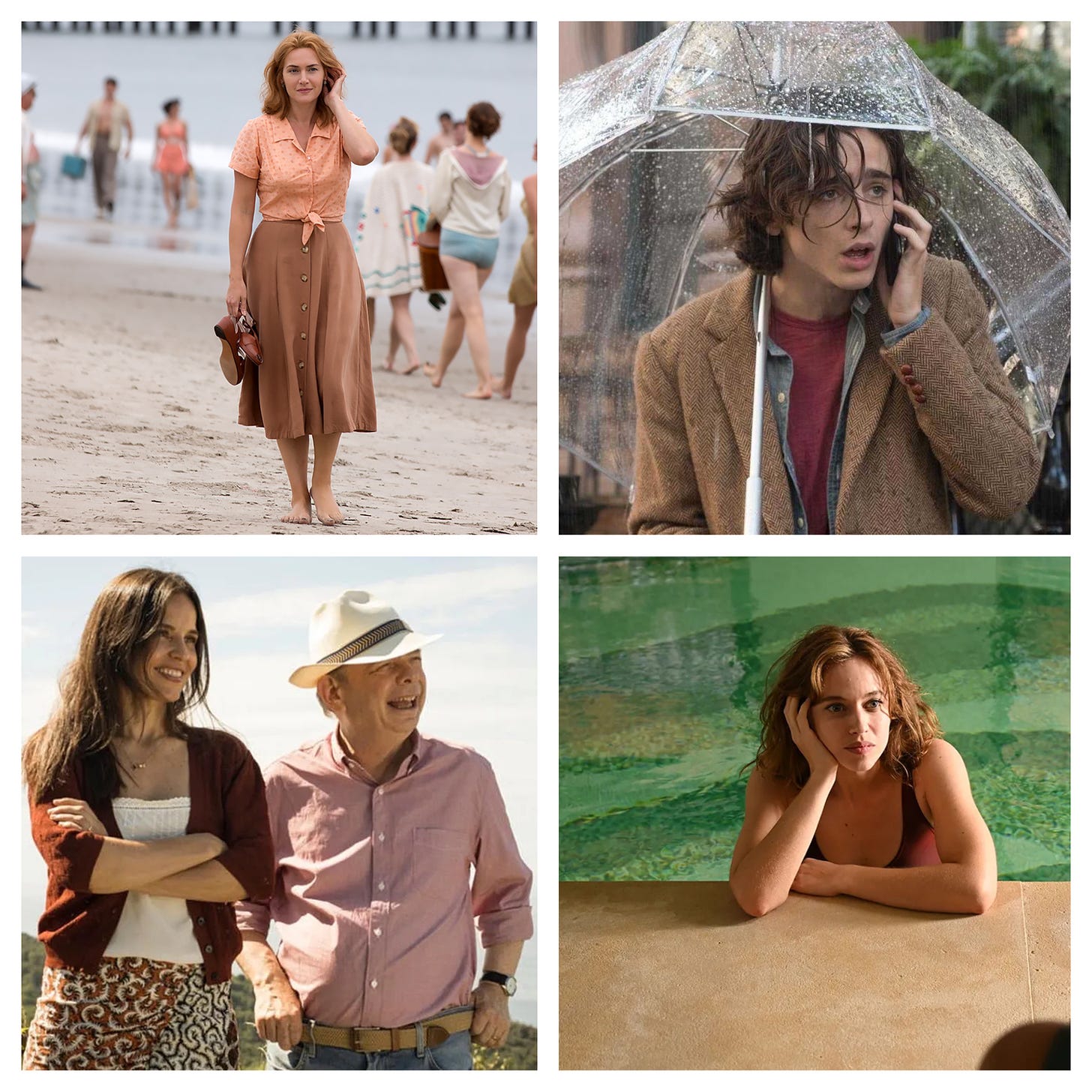
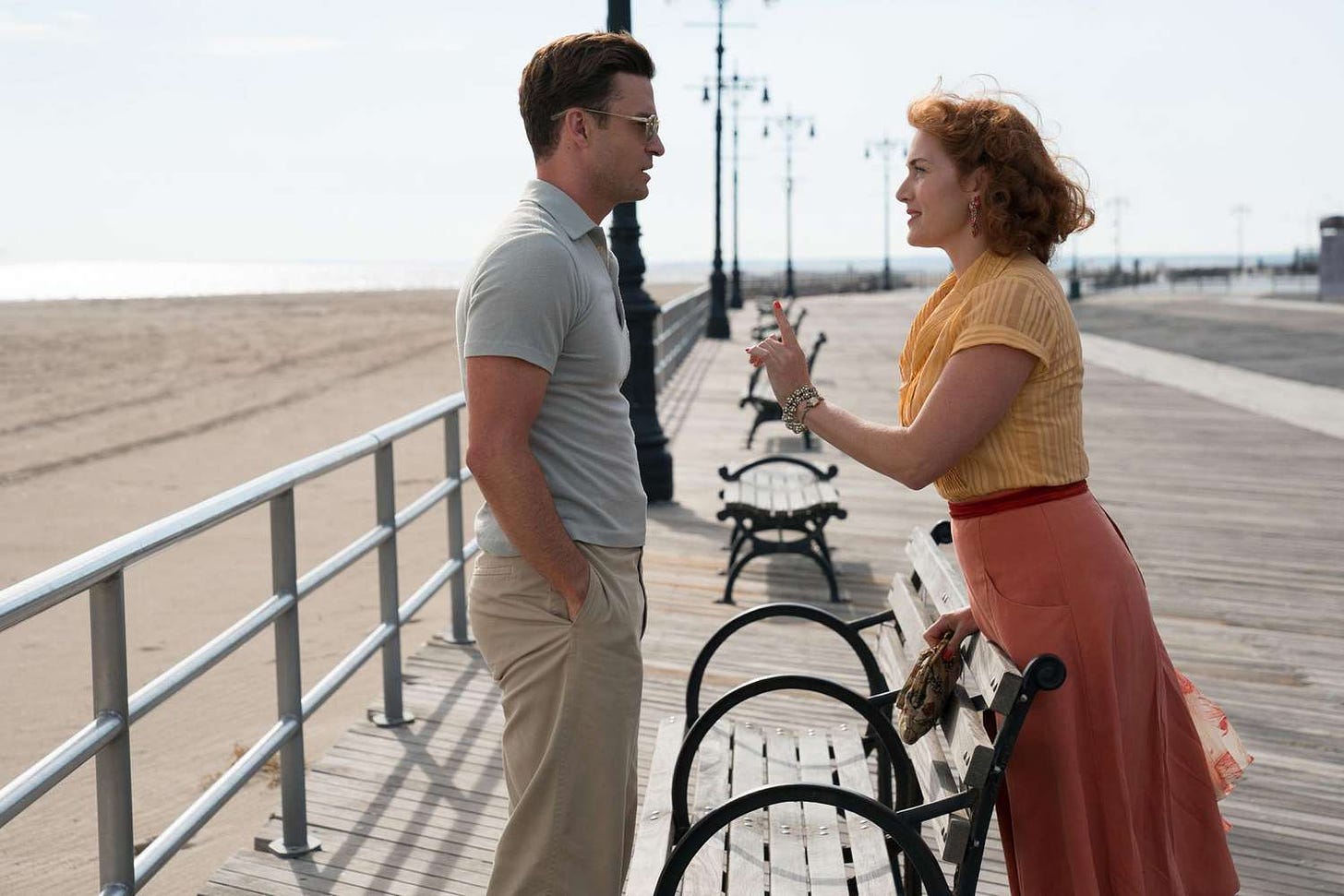
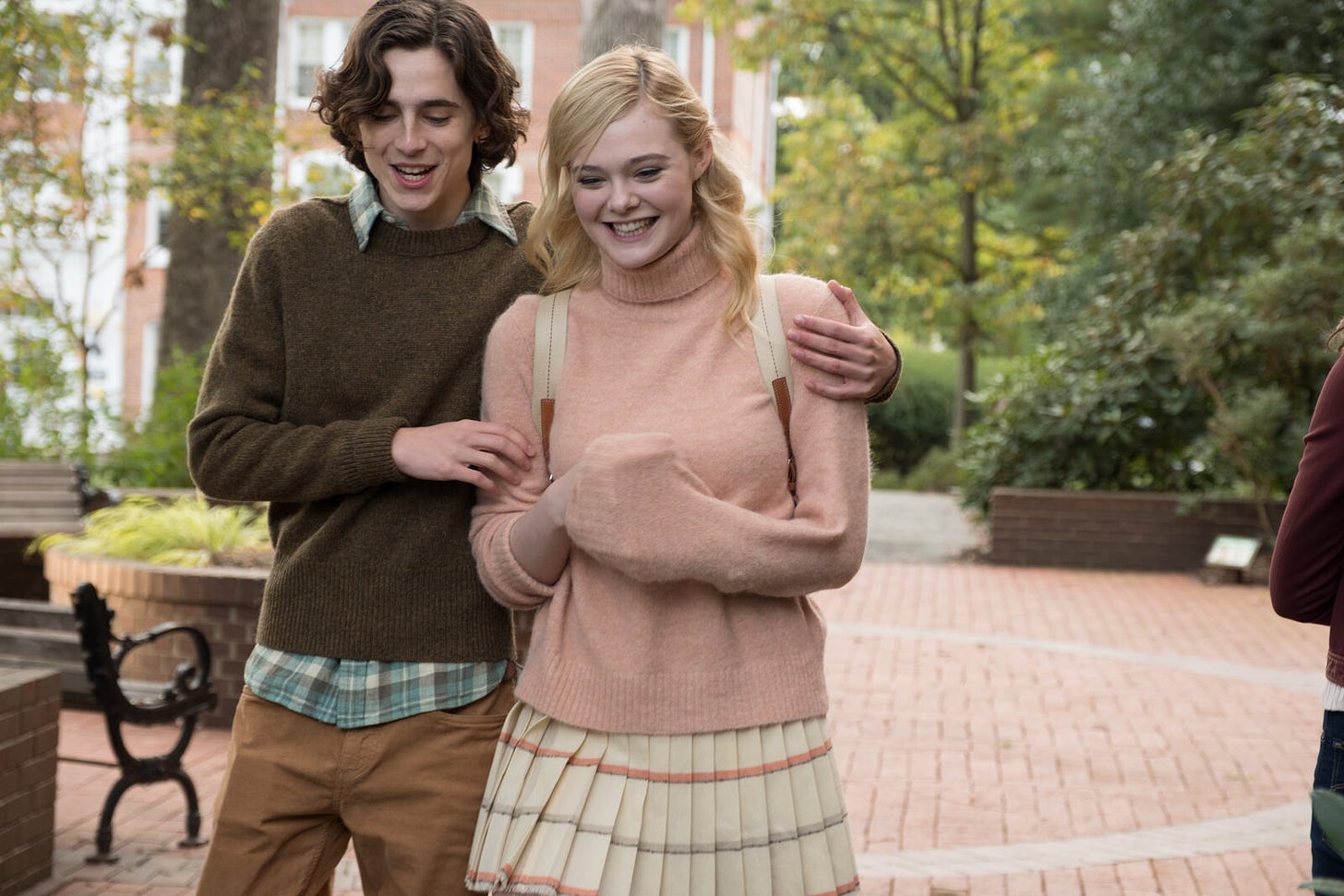
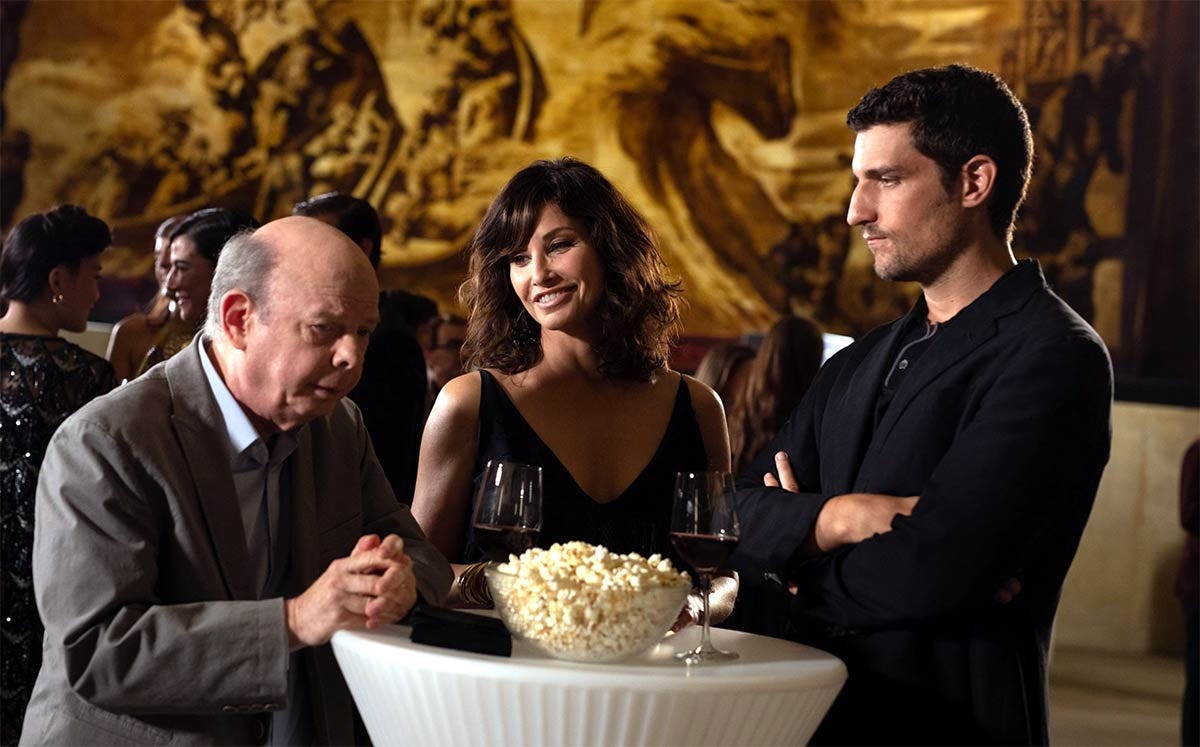
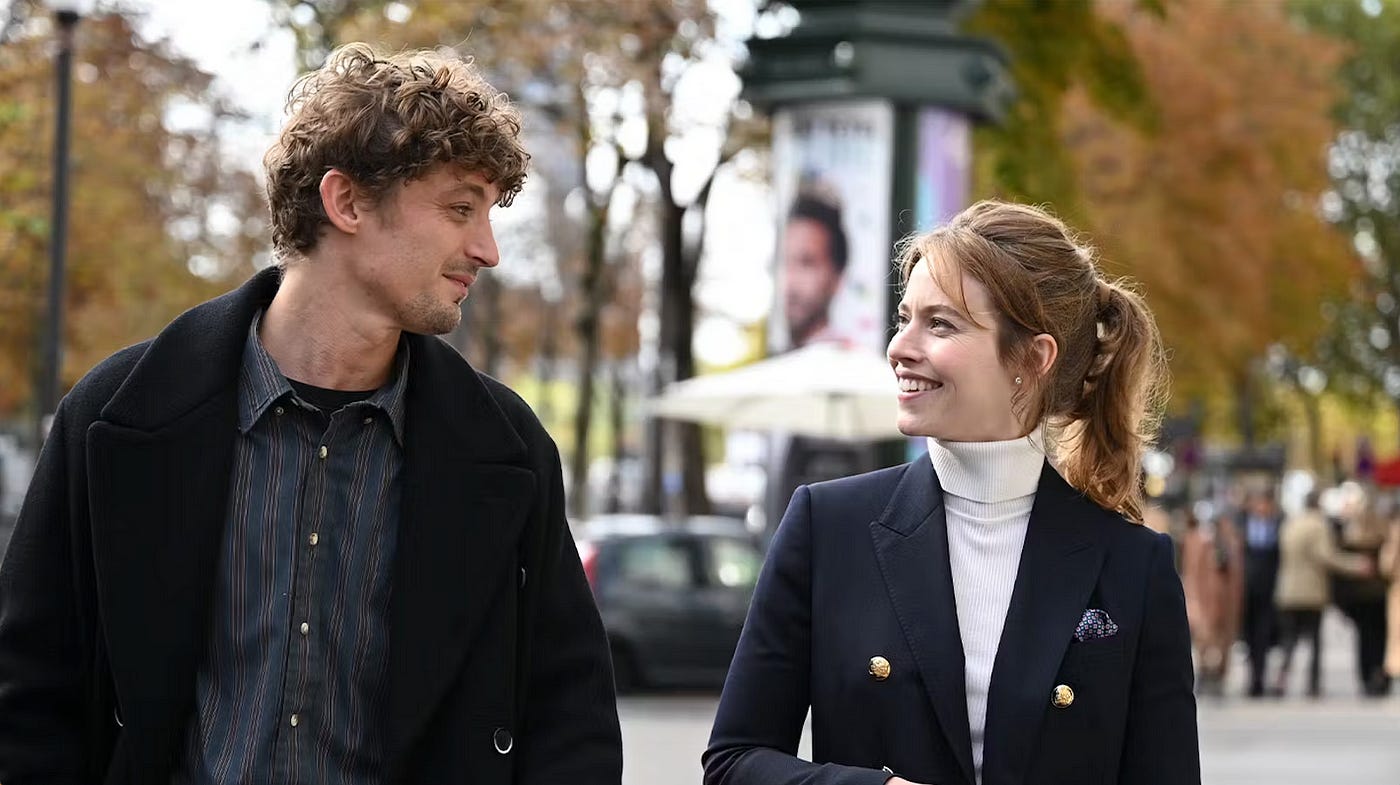
The spike in subscriptions over this piece has led us to consider a pivot into being a Woody Allen blog. Next week’s frame-by-frame breakdown of YOU WILL MEET A TALL DARK STRANGER is shaping up to be a banger.
My YouTube suggestions recently surfaced an opening monologue that John Mulaney and Nick Kroll did at the Independent Spirit Awards circa MeToo (good algorithm!). As usual, Mulaney summarized it perfectly (paraphrasing): Can I still not watch Woody Allen's last 20 unwatchable films in light of recent allegations that have been part of the public record for 30 years?
While there are films of his I really like, there have always been weird gender dynamics that made it impossible for me to love his work in the way that some do. I have never not been creeped out by Manhattan. There are filmmakers where you can have the artist vs work debate. (For example, Rosemary's Baby is a feminist movie!) But with Allen, it's always been right there. I finally stopped watching his movies after that abysmal Colin Firth/Emma Stone film. The film that tells us again and again how lucky she is that this smart, sophisticated, well-read man deigns to spend his time with her, and how he has so much wisdom that he can impart to her.